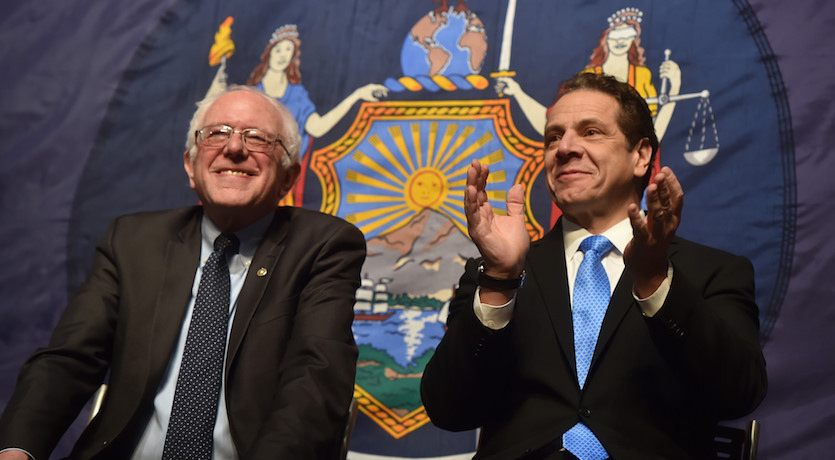
Vermont Senator Bernie Sanders joined New York Governor Andrew Cuomo in January when the governor unveiled his proposal for free college tuition. (GovernorAndrewCuomo/Flickr)
Last week, New York Governor Andrew Cuomo signed a bill making the Empire State the first state to cover tuition at all public colleges and universities for low- and income families.
New York’s decision to offer free tuition at public colleges follows similar efforts in Chicago, Oregon and Tennessee, where lawmakers have made community college free.
"We say every child has a chance to make it in our New York,” Cuomo said shortly before signing that legislation at LaGuardia Community College in Queens.
Under the new law, students whose families earn up to $125,000 won't have to pay tuition at the state's community colleges or four-year universities.
Supporters say the legislation could rekindle the national movement for tuition-free college sparked during the presidential campaign.
Critics point out that there are a lot of holes in Cuomo's free college program. For one thing, students still need to pay for room, board and other fees. For another, they 're required to stay and work in New York for the same number of years that they receive the benefit, otherwise grants convert to loans.
Regardless of the pros and cons of ‘free’ college, it's good news if you're a parent in New York, right?
Well, it could be bad news for the people running private and public colleges in neighboring states.
“I think they should be worried because it's the same admission market," said Brian Mitchell, the former president of Bucknell University in Pennsylvania.
Mitchell expects Cuomo's plan will reduce out-of-state admissions at private schools in the northeast.
“If you are subsidizing public sector tuition in the sense of making it free, you put the privates at a profound disadvantage,” Mitchell said. “It's not just the privates in New York State, but it's the privates in Pennsylvania and in Massachusetts. The first second and third largest collection of private colleges are in New York, Pennsylvania and Massachusetts respectively, and they should all pay close attention to this."
Boston University, New England's largest private school, for example, enrolls about 1,800 students from New York state. A BU spokesperson says it’s premature, and there are too many unknowns to speculate on the implications of New York’s free college plan.
Economists, though, say public universities in surrounding states should sit up and take note, too.
Facing declining enrollments, tightening state budgets, and increasingly price-conscious families, many public and private schools are all chasing the same students from New York.
Earlier: Massachusetts Enrollment In Public Colleges, Universities On The Decline
“We're always interested in what happens in markets where we're traditionally strong," said Jim Roche, Associate Provost for Enrollment Management at the University of Massachusetts Amherst, which enrolls about 1,100 undergrads from New York.
Roche says most of those students wouldn't qualify for Cuomo's scholarship program because their parents earn too much money. Still, he admits that it's tough to compete with 'free' when the average tuition for out-of-state students at UMass Amherst hovers around $16,000.
Roche says the school was already struggling to compete for New York students.
"Years ago we saw a demographic shift coming in the northeast and we took some steps to extend our reach and try to attract students from other markets throughout the United States and internationally." Roche said.
Over the past ten years, the percentage of students from New York has dropped at UMass Amherst.
And soon Massachusetts colleges may see more competition along its southern border. It's a smaller market, but Rhode Island is likely to become the next state to adopt free tuition.
In Providence, Governor Gina Raimondo is pushing to make two years of public college free for Rhode Island residents regardless of their income.
“The hardest part of college should not be paying for it,” Raimondo said during her State of the State address in January.
Earlier: Could Rhode Island Make Free College A Reality?
Right now, the plan is before the Legislature as lawmakers review Raimondo’s budget.
"I worry if we don't do something bold to increase the number of people that have a degree past high school that it will really hurt our economy," Raimondo told WGBH News.
A recent poll by Bryant University shows Raimondo's free college plan is quite popular. Sixty percent are in favor.
One major difference between Raimondo’s and Cuomo’s plan is that graduates wouldn’t be required to stay in Rhode Island.
WGBH's Tristan Cimini contributed to this report.
Related: How Germany Higher Ed Controls Costs










